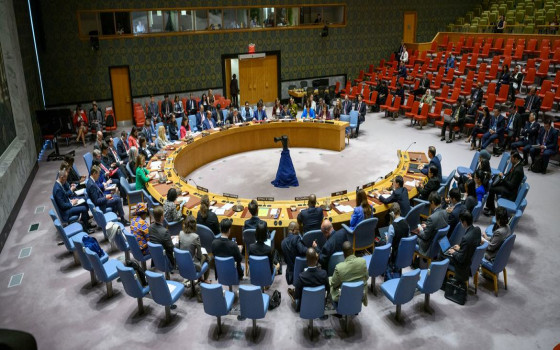The situation in Libya... The Special Representative of the Secretary-General of the United Nations stresses the need for a unified international plan and calls for an end to unilateral measures... She spoke about the economic crisis, elections, and disintegrating institutions.

- Europe and Arabs
- Friday , 18 April 2025 6:33 AM GMT
New York - Tripoli: Europe and the Arabs
The Special Representative of the Secretary-General of the United Nations in Libya called on the international community to cooperate in a unified plan to support a democratic state that meets the needs of the Libyan people and promotes economic growth and equitable development, noting that inaction would be more harmful than the cost of change. According to the UN Daily News Bulletin, a copy of which we received this Friday morning, Ms. Hanna Tetteh delivered her first briefing to the Security Council yesterday since assuming her position at the beginning of this year. She reviewed the report of the Secretary-General on the situation in Libya, highlighting the latest political, security, and economic developments in the country.
She said that since her arrival in Libya in February of this year, she has conducted extensive consultations with Libyan actors from various segments of society—political, military, security, and judicial—as well as with oversight institutions, political parties, civil society leaders, women leaders, and diplomats. She said that their views on the current situation in Libya are of utmost importance. She added that she heard divergent views, with most Libyan leaders calling for an inclusive political process and stressing the urgent need to end unilateral actions, unify institutions, and restore stability.
She noted that some believe that "a new unified government is the only solution, while others believe it will prolong the nearly 15-year transitional period."
She said that this view emphasizes the importance of strengthening existing institutions, noting that the formation of a transitional government has not addressed the fundamental challenges facing Libya. While all parties agree to hold elections, there are divergent views on establishing a constitutional framework before holding general elections.
She emphasized that the political will to reach a compromise is crucial to developing a consensual roadmap to resolve Libya's political crisis and end the transitional phase. "Therefore, elections must be integrated within a comprehensive political framework that enhances state-building through unified and strengthened institutions."
Supporting the Advisory Committee to Address Electoral Issues
Tetteh explained that the United Nations Support Mission in Libya (UNSMIL) supports the work of the Advisory Committee, which is tasked with developing options to address contentious electoral issues. She noted that the committee held sessions in Benghazi and Tripoli and is expected to submit its report, including options for moving forward, by the end of the month. She thanked the committee for its commitment to this important endeavor.
She also noted the progress made in the second phase of local elections, which will be held in 62 municipalities, including Tripoli, Benghazi, and Sebha. Voter registration concluded on April 15.
Preliminary figures indicate that more than 570,000 voters have registered, 31% of whom are women. "These elections are crucial to establishing democratic governance."
The Economic Crisis and the Impact of Fragmented Institutions
Tetteh warned that the political crisis in Libya continues due to competition for economic resources, fragmented institutions, and unilateral actions that deepen divisions.
She stated that the lack of a unified budget is exacerbating the situation, causing macroeconomic instability characterized by foreign exchange shortages, inflation, and currency depreciation. She noted that UNSMIL has engaged with economic experts to identify reforms for financial management and sustainability, stressing the mission's readiness to support the main political parties in agreeing on a unified budget to prevent a looming crisis.
Ceasefire Agreement Still Holding
Tetteh acknowledged that the 2020 ceasefire agreement is largely holding, but "the security situation remains volatile. Amid ongoing military buildup and hostile competition for territorial control, particularly among armed groups in the western region, the recent armed mobilization in and around Tripoli has renewed fears of a potential outbreak of violence in the capital."
She also expressed concern about "the recent rise in racist and xenophobic hate speech," which she said incites violence against migrants, asylum seekers, refugees, and humanitarian organizations providing life-saving support.
She warned that "portraying migrants as security threats has led to demonstrations, mass arrests, and a fatal shooting."
Tetteh also expressed concern about the continued "arbitrary detention" in Libya and called for the immediate release of all arbitrarily detained individuals. She highlighted the challenges facing women in Libya and called on the House of Representatives to expedite the adoption of a draft law to protect women from violence. In conclusion, she said, "The goal of the United Nations Support Mission in Libya is to support the Libyan people in ending successive transitional periods and establishing peace, stability, and good governance by, among other things, ensuring the unification of Libyan institutions and the holding of inclusive national elections."














No Comments Found